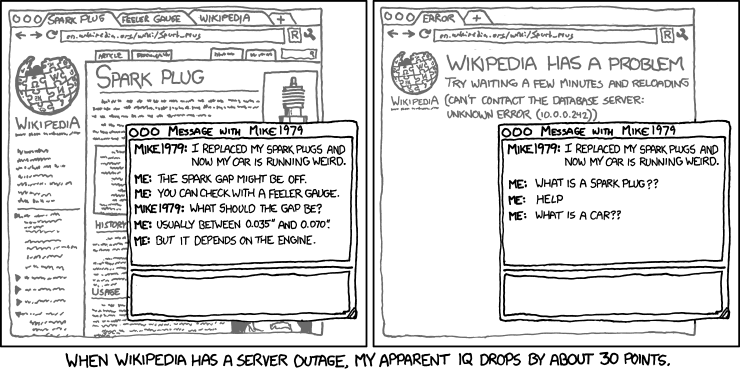Answer this not-so-simple question: How does use of the Internet, media, and/or technology change the way you think? Focus on your memory, your ability to concentrate, your sense of time and priorities, and the subjects/topics that interest you most. If you find "thinking about your thinking" difficult to assess, try the following strategies: compare yourself with older people who did most of their formal learning before smart phones and 2.0 existed; compare yourself with contemporaries who don't use those tools much today; read up on what education leaders and thinkers have to say about generational differences in thinking (and remember to cite your sources).
First off, I'm going to link to the XKCD strip Extended Mind because it's relevant but mostly because I just like linking to XKCD

...anyway, I know that for myself personally, the Internet has given me almost a sort of disdain for unevidenced "conventional wisdom" and faith in facts and statistics instead, all of which are readily available to me within a few clicks. At the moment I'm under some rather severe dietary restrictions for my health, and I'm never satisfied with reasoning like, "Well this is a vegetable, it must be ok for me to eat." Before eating anything I always look up the nutrition facts, glycemic load, how it's made if it's a processed food (ex. I can't eat anything fermented, so turns out I can't eat chocolate. Did you know chocolate is fermented? I didn't. Thanks Wikipedia), etc. Such immediate access to facts makes me question statements with the imperative "Prove it."
However, I know that the Internet has probably also shortened my attention span, because I'm ALWAYS tab surfing. Even when I'm doing homework, at any given moment I probably have Listube, Pandora, my email, XKCD or Dinosaur Comics or something, and a Google search of whatever I just thought of 10 seconds ago open in other tabs. The Internet has made it so whenever you think of something (ex. "Hey, I wonder if I have any new emails since I checked it an hour ago?") you can and probably will search/check/access it, regardless of the task at hand. Given the ubiquity of computers, as desktops, laptops, tablets, smartphones, smart glasses, and according to a commercial I saw last month, smart watches (!), the status quo really isn't that much different than the hypothetical Google search in your brain mentioned in the passage.
(Also, I just have to say this. When the article mentioned "computers that pay attention to what's going on around them and suggest useful information" I was like, "OH GOD. NAVI." Otakus in the house will get it.)
No comments:
Post a Comment